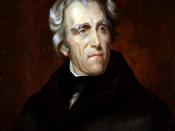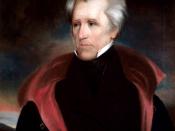The year was 1824. The election of this year was very unusual because of the number of candidates running for president. One of the candidates was Andrew Jackson, or "Old Hickory" as they called him, a general that had won the Battle of New Orleans(which was a battle not needed) in the War of 1812. Jackson became a hero after this war, and it would bring him all the way to the presidency. Another one of the candidates was John Quincy Adams. The son of John Adams, the second president of the United States, Adams was a excellent debator from New England. He was the only candidate from the NorthEast. The two other candidates were William Crawford and Henry Clay. Crawford, the secretary of the Treasury during the presidential term of James Monroe, seemed desperate for votes. Martin Van Buren, a political influence from New York, supported Crawford.
James Madison, the fourth president of the United States, actually made Crawford the candidate of the fading Virginia Dynasty which had controlled the presidency for twenty-four years thanks mostly in part to a working agreement with New York. I think Van Buren supported Crawford because of the respect that he had for this fading dynasty.
In May of 1824, a Cumberland planter, Alfred Bach, visiting Washington, sent John Overton a disturbing account of Jackson's prospects. "I think his strength is {giving} out... Crd is undoubtedly the strongest man." Daniel Webster surveyed the field with satisfaction. "Jackson's interest is evidently on the wane." When all the votes were in, Jackson received the popular vote, but he didn't have the majority needed in the electoral college to become president. The vote then was in the hands of the House of Representatives. Jackson had ninety-nine votes, Adams with eighty-four, Crawford with forty-one,


